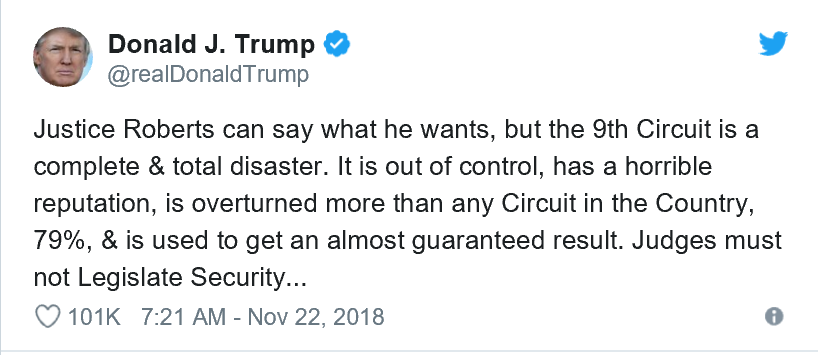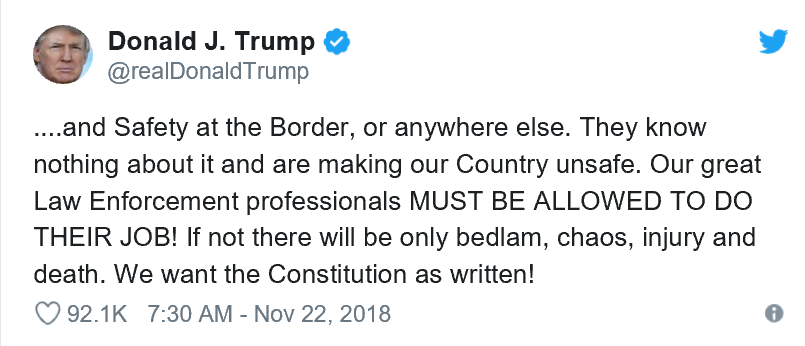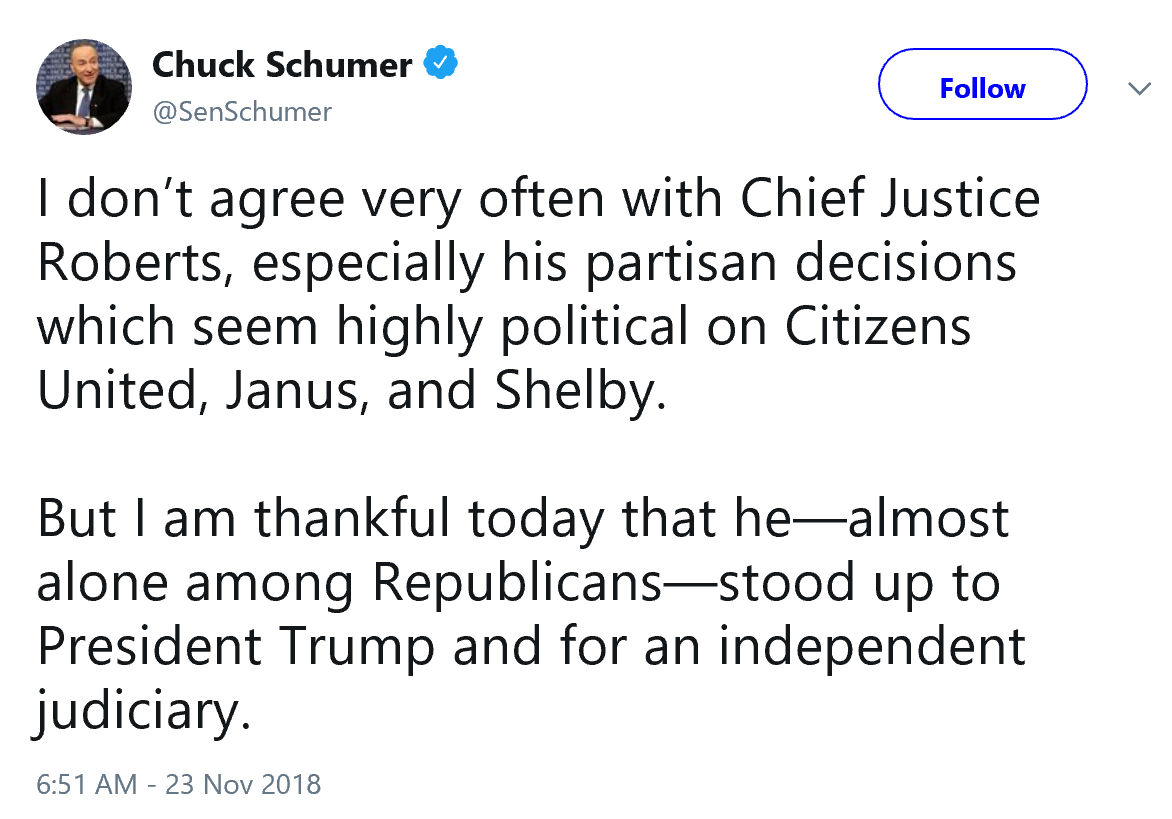John Roberts Is Wrong. America’s Courts Are Obviously Politicized By Margot Cleveland
http://thefederalist.com/2018/11/26/john-roberts-wrong-americas-courts-obviously-politicized/
JUDGEMENT DAZE…RSK
Supreme Court Chief Justice John Roberts’ attempt to defend the independence of the judiciary, in light of President Trump’s comments that courts are politicized, did more harm than good.
Last week, after San Francisco-based federal judge Jon Tigar blocked enforcement of the administration’s recently updated asylum regulations, President Donald Trump condemned the decision, calling Tigar an “Obama judge.” “It’s a disgrace what happens in the Ninth Circuit,” Trump complained to reporters, adding that in practically every case plaintiffs file in the Ninth Circuit “we get beaten and have to go to the Supreme Court and we win.”
Chief Justice John Roberts responded to the president’s criticism with his own: “We do not have Obama judges or Trump judges, Bush judges or Clinton judges,” he said in a statement issued Wednesday by the Supreme Court. “What we have is an extraordinary group of dedicated judges doing their level best to do equal right to those appearing before them. That independent judiciary is something we should all be thankful for,” Roberts concluded, in a nod to the then-upcoming national holiday.
As is his wont, Trump took to Twitter, telling the chief justice we “do indeed have ‘Obama judges,’ and they have a much different point of view than the people who are charged with the safety of our country.” The next day Trump hit the theme again in a pair of tweets that began, “Justice Roberts can say what he wants, but the 9th Circuit is a complete & total disaster.”


“Judges must not Legislate Security and Safety at the Border,” the commander-in-chief tweeted, in reference to Tigar’s decision halting the Trump administration’s new asylum regulations. The regulations provide that, to be eligible for immigration asylum, foreign aliens must enter the United States at an official border crossing.
Roberts’ attempt to defend the integrity and independence of the judiciary did more harm than good. Had Roberts not entered the fray, Trump’s “Obama judge” comment would likely have past mainly unnoticed. Instead the chief justice elevated the profile of the president’s criticism and raised the question of whether Trump was right: Are there Trump and Obama judges, Bush and Clinton judges, and Bush, Reagan, and Carter judges?
Absolutely. Here are five proofs.
1. Schumer Applauds the Highly Partisan John Roberts
Sen. Chuck Schumer highlighted the first proof of Trump’s proposition in the most amusing way: The long-time liberal senator thanked Roberts for standing up to President Trump while condemning Roberts’ “partisan decisions which seem highly political on Citizens United, Janus, and Shelby.”

What about those cases? In Citizens United, in a 5-4 decision, the Supreme Court held that Congress cannot restrict the amount of money corporations, labor unions, and other associations expend for political communications. The five-justice majority consisted of two Ronald Reagan appointees, justices Anthony Kennedy and Antonin Scalia; one George H.W. Bush appointee, Justice Clarence Thomas; and two George W. Bush appointees, justices John Roberts and Samuel Alito. The four dissenting justices were appointed by Gerald Ford (Justice John P. Stevens), Bill Clinton (Ruth Bader Ginsburg and Stephen Breyer), and Barack Obama (Sonia Sotomayor).
The Supreme Court likewise decided the Shelby County case in a split 5-4 decision. In that case, the five-justice majority, consisting of justices Scalia, Kennedy, Thomas, Roberts, and Alito, held that a provision of the Voting Rights Act of 1965 was unconstitutional because the formulas used in the statute were more than 40 years old and therefore could no longer justify interfering with state and local governments’ control over elections. Justices Ginsburg, Breyer, Sotomayor, and Obama’s most recent nominee, Elena Kagan, all dissented.
The final “partisan” decision Schumer highlighted, Janus, concluded in a 5-4 decision that non-members cannot be forced to pay government employee union fees. Justices Alito, Roberts, Kennedy, Thomas, and Trump-appointee Neil Gorsuch made up the majority, with Obama justices Elena Kagan and Sotomayor dissenting, along with Clinton appointees Ginsburg and Breyer.
While Roberts might not see it, Schumer and the rest of America see a clear connection between the political party of the appointing president and justices’ votes in close cases.
2. Check Out the State of the Union
President Obama’s decision, in his January 2010 State of the Union address, to chastise the Supreme Court justices for the Citizens United decision—warning Americans it would open the flood gates to special interests, including money from foreign corporations—provides further proof of Trump’s point.
Not only did the Democrat president, during a joint session of Congress, condemn the majority opinion handed down by the five Republican-appointed justices, but the partisan rift was on full display to the watching country when the left side of the aisle stood alone in applause to the presidential pushback, while Republicans remained seated.
3. Research Backs Up These Anecdotes
It is not merely the anecdotal, though, that supports Trump’s assertion that there are Obama judges, and other judges modified by their respective appointing president. Legal and political science scholars have been researching the relationship between judges’ voting patterns and the political party of the appointing president for nearly 20 years. That research has included statistical techniques and analyses and has concluded that there is “striking evidence of a relationship between the political party of the appointing president and judicial voting patterns.”
4. The Case of Merrick Garland
Supreme Court Justice Antonin Scalia’s sudden death in February 2016 created a vacancy on the high court during an election year. If the nominating president mattered none, the Republican-controlled Senate would have moved on President Obama’s pick of Merrick Garland and confirmed the federal appellate judge to the high court.
But that didn’t happen. Instead, Senate Majority Leader Mitch McConnell informed President Obama that the Senate would not take up any nominee he puts forward and that the appointment should be left to the next commander-in-chief. When Obama nominated Garland to fill the slot anyway, Republicans stayed true to their word and waited out the election.
Democrats still hold a grudge over what they see as a Supreme Court seat stolen by Republicans. Apparently, there is a difference between an Obama justice and a Trump justice after all.
In fact, Republicans also saw a difference between an Obama justice and a Clinton justice, as seen by the idea floated prior to Trump’s surprise victory that they might confirm Garland during a lame-duck session should Hillary Clinton win. According to the Huffington Post, Sen. Jeff Flake noted “The only position I’ve had is ‘Hey, I’m concerned about the direction of the court,’ and so if we come to a point where we’ve lost the election, and we can get a centrist like Garland in there as opposed to someone like Hillary Clinton might appoint then I’d go for it.”
5. Kavanaugh’s Confirmation Clinches It
Should any doubt remain that Trump nailed his assessment of Obama judges, one need only look at anything about Kavanaugh’s ascension to the Supreme Court: from the questioning in the initial judiciary committee hearings to the final party-line vote, Democrats wanted nothing more than to prevent the Republican president from picking the next Supreme Court justice.
The last-minute character assassination attempt on Kavanaugh provided even starker proof that the Democrats viewed Kavanaugh as a Trump justice. Sen. Dianne Feinstein kept Christine Blasey Ford’s accusations secret from Republican committee members, and Democrats refused to participate in the Senate committee’s investigation into Ford’s allegations. When Democratic judiciary committee members interrogated Kavanaugh about Ford’s accusations (and his high school yearbook!) before a national television audience, the reality of the judiciary’s partisanship became cemented in the public’s consciousness.
Democrat Senate Judiciary Committee member Cory Booker also made Trump’s point when the first-term New Jersey senator argued that Trump has a conflict of interest in appointing a Supreme Court justice. “President Trump is currently a subject of an ongoing criminal investigation, and any nomination of a Supreme Court justice while that investigation continues is unacceptable because of the clear conflict of interest inherent in the president installing someone who could be the deciding vote on a number of potential issues from that investigation.”
Or, to paraphrase the president: to the left, Kavanaugh is a Trump justice.
Comments are closed.
